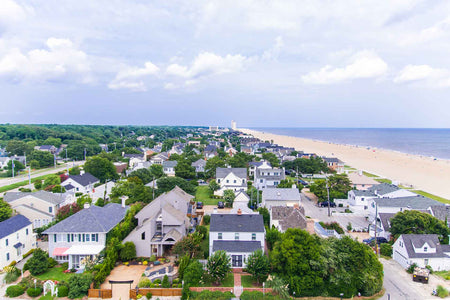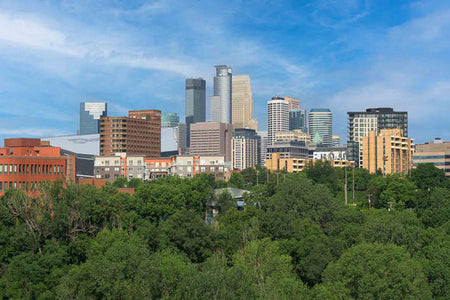- Allergy season in Georgia typically spans from January to late September, with peak periods in spring (March to May) and late summer to fall (August to October).
- Pollen from trees, grasses, and weeds are the primary culprits, but indoor allergens like mold, dust mites, and pet dander can also contribute to symptoms.
- Taking protective measures, such as wearing appropriate gear and starting allergy medication like a combination nasal spray in advance, can help minimize exposure to allergens.
If you’ve ever experienced a sudden onset of sneezing, itchy eyes, or a stuffy nose in Georgia, you’re not alone. Allergy season in the Peach State is notorious for its intensity due to its diverse mix of trees, grasses, and weeds that thrive year-round.
From the explosion of yellow pollen that blankets cars and sidewalks in spring to the persistent allergens that remain throughout the fall, Georgia’s mild climate creates an ideal environment for seasonal allergies.
Familiarizing yourself with the timing of allergy season in 2025 can help you minimize discomfort and enjoy the beauty and vibrancy of Georgia.
Related: The 5 Best and Worst States for Pollen Count
When is the Pollen Season in Georgia?
Pollen season in Georgia typically starts as early as January and lasts through late September, depending on the specific region and weather conditions.
In the cooler, higher elevations of North Georgia, pollen season often starts a bit later, around early to mid-March. Tree pollen from oak, pine, and birch dominates during spring. Grass pollen appears in late spring and early summer, while ragweed and weeds peak in late summer through early fall.
In Metro Atlanta and Central Georgia, Pollen season in these areas begins earlier, typically in late February, as the warmer climate prompts trees to release pollen sooner. Tree pollen is most intense in early spring, followed by grass pollen in May and June. Weeds like ragweed cause issues from late summer into September.
South Georgia experiences the earliest and often longest pollen season, starting as early as mid-February. The warm climate encourages an extended period of tree, grass, and weed pollen production. Ragweed and other weeds may continue causing allergies well into late September or October.
Related: 10 Worst Cities for Seasonal Allergies
What are the Worst Months for Allergies in Georgia?
The worst months for allergies in Georgia typically depend on the specific allergens affecting the area, but generally, March through May and late August through October are the most challenging periods:
- Spring (March to May): This is the peak season for tree pollen, which is a major allergen in Georgia. Trees like oak, pine, birch, and maple release large amounts of pollen during these months. Pollen counts tend to spike on dry, windy days, which exacerbates symptoms for those sensitive to these allergens [*].
- Late Summer to Fall (August to October): Ragweed and other weed pollens dominate during this time. Ragweed is particularly pervasive, with its pollen traveling long distances and persisting into October in some regions. Mold spores can also increase during this period due to humid conditions [*].
When Does Pollen Season End in Georgia?
Pollen season in Georgia typically ends in late September or early October, depending on the region and weather conditions, and slightly varies in different regions.
North Georgia typically ends by mid to late September. The earlier onset of cool temperatures helps reduce pollen from weeds like ragweed and mold spores.
Metro Atlanta and Central Georgia pollen season typically end around late September to early October. The warmer climate allows weed pollen, especially ragweed, to linger slightly longer, but cooler nights in early fall gradually suppress pollen production.
South Georgia often experiences the longest pollen season, which can extend into mid-October or even later during unseasonably warm years. The humid, warm climate supports prolonged weed pollen and mold spore production.
Common Allergens in Georgia
While pollen from trees, grasses, and weeds dominates allergy season, indoor allergens like mold, dust mites, and pet dander may cause symptoms year-round:
- Oak
- Pine
- Birch
- Maple
- Hickory
- Bermuda
- Fescue
- Ryegrass
- Ragweed
- Pigweed
- Mold
- Dust mites
- Pet dander
How to Prepare for Seasonal Allergies in Georgia
Seasonal allergies don’t have to disrupt your life. Small, manageable changes to your daily routine can go a long way in reducing symptoms. Consider these steps:
- Regularly check local pollen forecasts to anticipate high-pollen days, especially during spring, late spring to early summer, and late summer to fall.
- Use HEPA air purifiers in bedrooms, living rooms, and other frequently used spaces, such as home offices or nurseries. These filters capture tiny particles, including pollen, dust, and pet dander.
- Vacuum carpets and upholstery regularly using a vacuum with a HEPA filter.
- Starting allergy medications a few weeks before the start of pollen season is an effective strategy for getting ahead of symptoms. If you're looking to specifically target nasal passages, nasal sprays can be a great option. Consider using a product like Allermi, which combines multiple active ingredients tailored to target common allergens and can be customized based on your symptoms.
- Plan outdoor activities for early mornings or after rain, as pollen counts are lower during these times.
- Keep windows closed during high-pollen periods, as indicated by the pollen forecast, to prevent allergens from entering your home. Instead, use air conditioning to maintain proper ventilation
- Shower and change clothes after spending time outside to remove pollen from your body and clothing.
- Wearing sunglasses helps protect your eyes from direct exposure to pollen, whereas a wide-brimmed hat can help reduce pollen exposure to your face and hair by creating a barrier. Together, these accessories can provide a simple yet effective way to minimize allergen contact when you're outdoors.
The Bottom Line
With the right preparation, starting by knowing the timing of allergy season, you can stay ahead of your symptoms, breathe easier, and enjoy Georgia’s seasons without constant sneezing or itching.
Simple adjustments, like using air purifiers, wearing protective gear outside, and starting nasal sprays early, can reduce your exposure to allergens. If you're unsure about what’s best for your symptoms, it's always a good idea to consult a doctor to make sure you're on the right track.
References:
- Pollen Allergy. (2020, April 30). Allergy & Asthma Network. https://allergyasthmanetwork.org/allergies/pollen-allergy/
- ScienceDirect. (n.d.). Mould growth. ScienceDirect. https://www.sciencedirect.com/topics/engineering/mould-growth









